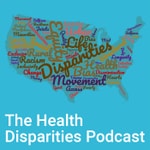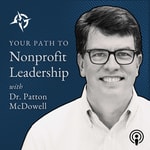The Health Disparities Podcast – Details, episodes & analysis
Podcast details
Technical and general information from the podcast's RSS feed.

The Health Disparities Podcast
Movement is Life, Inc
Frequency: 1 episode/12d. Total Eps: 181

Recent rankings
Latest chart positions across Apple Podcasts and Spotify rankings.
Apple Podcasts
🇬🇧 Great Britain - medicine
28/12/2024#90🇫🇷 France - medicine
10/11/2024#90
Spotify
No recent rankings available
Shared links between episodes and podcasts
Links found in episode descriptions and other podcasts that share them.
See all- https://www.naacpldf.org/
649 shares
RSS feed quality and score
Technical evaluation of the podcast's RSS feed quality and structure.
See allScore global : 27%
Publication history
Monthly episode publishing history over the past years.
Rural health challenges and opportunities, Part 2: The hospital administrators’ perspective
Episode 179
mercredi 6 novembre 2024 • Duration 31:27
When we consider what it takes to improve the health of rural Americans and address rural health disparities, there's no one size fits all solution. Because, as the saying goes, if you’ve seen one rural community, you’ve seen one rural community.
In our latest podcast series, we are digging into rural health: the challenges, and the opportunities. We’re highlighting the diversity of rural communities and addressing common misconceptions..
In today’s episode, Health Disparities podcast host Sarah Hohman checks in with three people who work in rural hospital leadership and administration, doing incredibly important work, often with limited resources:
- Michael Calhoun, Chief Executive Officer/Executive Director for Citizens Memorial Healthcare, an integrated healthcare system serving over 130,000 residents in southwest Missouri.
- Mandy Shelast, the President of Marshfield Clinic Health System’s Michigan and Southern Regions, and the President of the National Association of Rural Health Clinics.
- Dr. John Bartlett, a practicing primary care physician and the Vice President of Medical Affairs for the Michigan Region of Marshfield Clinic.
Some of the biggest challenges are related to the health care workforce and staffing, in particular for specialty care.
“If we lose a chemo nurse in a town of 10,000 there's not five other ones looking for that job,” Bartlett says.
“What I'm concerned about is just our aging population and how we're going to be able to train a workforce enough to be able to care for all the people that need it, that's a real concern,” Calhoun says.
All three guests addressed common misconceptions about rural America, and emphasized the benefits of rural, including a slower pace of life and having providers who are passionate about the mission of providing excellent, personalized health care.
“The patients that we care for are our friends and our family and our community members,” Shelast says. “We take care of them on the very best days of their life — maybe when they're welcoming a life into the world — and on the worst days, when they're having a medical emergency or they've received a terminal diagnosis, and it is just such a great experience to be able to go up to that person and say, 'I'm here for you.’”
Never miss an episode – be sure to subscribe to The Health Disparities podcast from Movement Is Life on Apple Podcasts, YouTube, or wherever you get your podcasts.
Rural health challenges and opportunities, Part 1: A conversation with the CDC and HHS
Episode 178
mercredi 23 octobre 2024 • Duration 39:03
People in rural areas have higher rates of certain chronic conditions and disabilities and can expect to live a couple years shorter, on average, compared to people in urban areas. The health disparities facing rural Americans stem from many factors – including geographic, economic, social, and systemic issues.
But in the midst of all this, there is hope. There’s greater awareness of the importance of rural health care and public health resources, and a growing number of federal agencies dedicated to supporting data-driven solutions aimed at addressing rural health challenges.
Two individuals behind some of those efforts join the Health Disparities podcast to discuss rural health challenges and opportunities:
- Tom Morris, Associate Administrator for the Federal Office of Rural Health Policy at HHS
- Diane Hall, Director for the Office of Rural Health in CDC's Public Health Infrastructure Center
“There's been a lot of focus on access to health care in rural areas, which is absolutely incredibly important,” Hall says. “But I also think we need to really pay attention to the public health infrastructure, which has also been decreased because of budget issues [and] because of the impact of the pandemic.”
Addressing rural health needs is a bipartisan issue, says Morris.
“There may be disagreements about how you get to the outcome, but there's no disagreement about what the challenges are,” Morris says. “...The partisan divide sort of falls apart when you dive into the issues.”
Morris and Hall speak with Health Disparities podcast host Bill Finerfrock about the priorities of their respective offices, common myths about rural America, and what gives them hope as they consider the future of rural health.
Never miss an episode – be sure to subscribe to The Health Disparities podcast from Movement Is Life on Apple Podcasts, YouTube, or wherever you get your podcasts.
Can predictive AI reduce health disparities in orthopedic surgery? This UK researcher aims to find out
Episode 169
mercredi 19 juin 2024 • Duration 29:04
Artificial Intelligence is transforming health care. The promise of this technology is enormous and is already being realized to increase the accuracy of diagnoses, promote patient engagement, increase efficiency in health care and lower costs.
It’s even being used to identify patients at risk of disease and predict patients who might be good candidates for medical procedures.
Done well, AI tools can help ensure patients with the greatest need for orthopedic surgery are prioritized for care, and help reduce health care disparities, says Luke Farrow, an orthopedic and trauma surgeon and clinical researcher at the University of Aberdeen in Scotland.
But without proper considerations, “you can ultimately end up with AI systems that worsen those health disparities, which is obviously the last thing we want. And there is definitely evidence out there to suggest that does happen if we're not careful.”
Health Disparities podcast host Dr. Mary O’Connor spoke with Farrow about AI and health equity, and about his ongoing research on the use of AI to help general practitioners in the UK know when it is appropriate to refer patients to orthopedic surgeons for consideration of hip and knee replacement surgeries.
Never miss an episode – subscribe to The Health Disparities podcast from Movement Is Life on Apple Podcasts, YouTube, or wherever you get your podcasts.
Physician Assistants have an increasingly important role in healthcare. Featuring Klarisse Mathis.
mercredi 23 décembre 2020 • Duration 28:22
Safety net hospitals are crucial, but closures are making healthcare less universal. Featuring Dr. Eric Santos.
mercredi 16 décembre 2020 • Duration 25:10
How Nurse Practitioners drive health equity through vital rural and frontier healthcare. With Wesley Davis and Cristina Gonzalez.
mercredi 9 décembre 2020 • Duration 35:43
Peggy’s Story: Operation Change, South Side, Chicago.
mercredi 2 décembre 2020 • Duration 39:01
Lynn’s story: a new outlook on life from new knowledge gained – and her fitness tracker.
mercredi 25 novembre 2020 • Duration 34:21
Ovidia’s story: Learning about health disparities motivated her to make changes.
mercredi 18 novembre 2020 • Duration 22:22
Latinx clinical research inclusion: how Dr Fabian Sandoval and Dr Gustavo Corrales teamed up to move the needle.
mercredi 11 novembre 2020 • Duration 35:26









